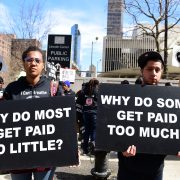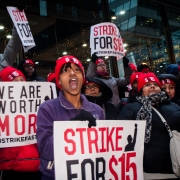For decades, free-market economists have warned that there are consequences to raising the minimum wage. However, despite economic principle and historical examples pointing to the contrary, labor activists have continued to campaign for a higher minimum wage, clinging to the belief that a “living wage” will result in the demise of income inequality.
While the prospect of a higher wage appeals to just about everyone, many seem to forget that money does not simply appear out of thin air. When employers are mandated to pay their employees a higher wage, that money must come from somewhere. Governments may be responsible for enforcing wage policies, but it is the employers who are left with the financial burden of figuring out how to provide for these pay increases.
In many instances, employers are forced to cut hours, lay off employees, or raise the price of consumer goods and services in order to meet the new payroll standards. This is the dilemma currently facing many employers in Washington State, where a new minimum wage law is already resulting in some unintended consequences.
In 2016, Washington residents voted to increase the minimum wage incrementally from $9.47 an hour to $13.50 an hour by 2020. For Advent Lutheran Child Center in Spokane Valley, the minimum wage increase meant an inevitable increase in tuition costs, which has left many parents shocked and concerned.
Beginning in January 2017, the cost of tuition increased to $140 a month per child. For parents with multiple children, this is an added burden of several hundred dollars a month.
One parent who voted in favor of the new minimum wage commented on the matter, saying, “I understand that they need to capture their difference and make that money back, but then so does everybody else.”
Unfortunately for parents hoping to find a cheaper daycare option for their children in wake of the wage increase, they may not find any alternatives. A local news affiliate reached out to other daycare centers in the area and found that tuition increases across the board seem almost inevitable at this point.
Kristin Larson, a program supervisor at the childcare center and an advocate of a living wage said, “I feel the state needs to be helping a little more, it would be nice if parents didn’t have to spend a majority of their paychecks for childcare.”
Unfortunately, Larson’s comments strike at the heart of the matter. It would be great if the state had to foot the bill for the increased wages, but the state has no source of revenue that does not come directly at the expense of its citizens. Whether through direct taxes or from revenue generated by traffic citations or other minor infractions, the state does not have the means to pay for a wage increase. However, neither do many Washington businesses.
When wages are inflated artificially (not as a natural response to increased market demand and higher profits), financial hardships are inevitable. As children, we were taught that money doesn’t grow on trees. However, this lesson seems to have been lost on proponents of minimum wage increases.













